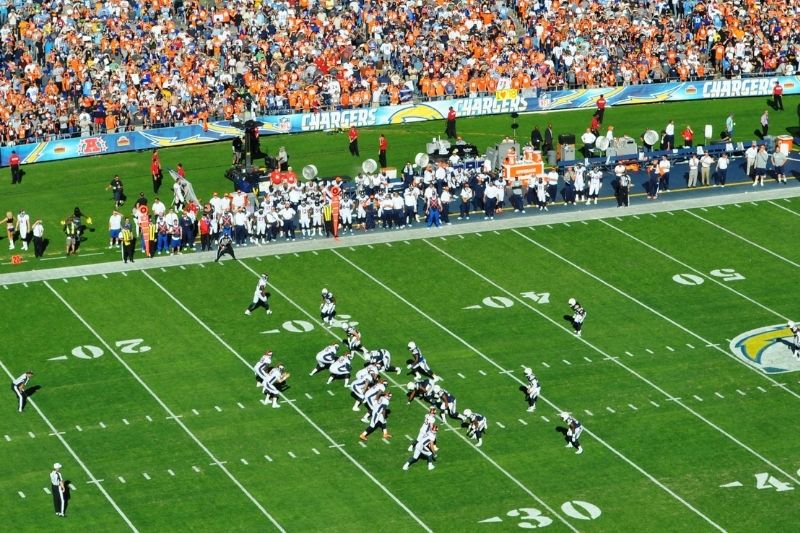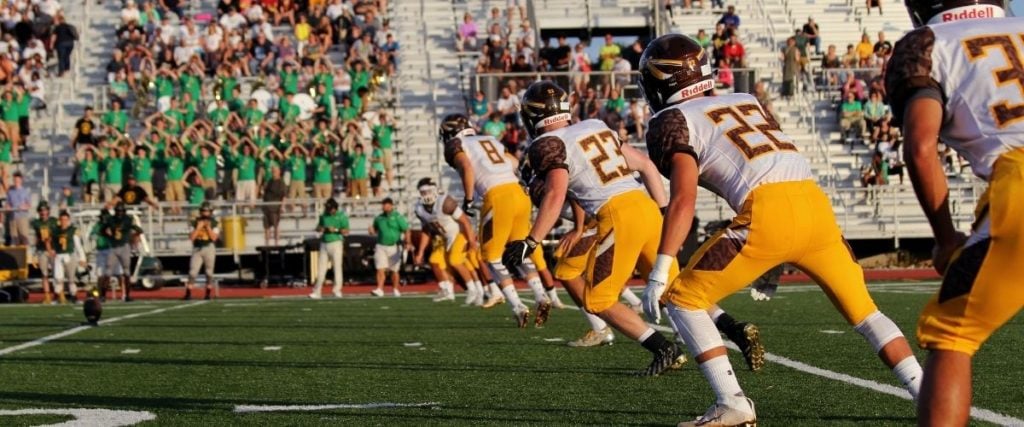Why do business leaders love applying sporting concepts to their businesses? Here, we break down the sporting analogies that the business world is rife with and the lessons that entrepreneurs can learn from professional sports teams.
Professional sports and business are very similar in many aspects: in both, you need hard work, a committed team, and just a little bit of luck in order for things to go your way. For that reason, it’s not uncommon to see business experts and entrepreneurs use sporting analogies to explain business concepts. Here are 7 lessons you can take from professional sports that can improve your management skills and help your business.
Understand the different strengths of your employees
Take the NFL for example. An NFL team is allowed a maximum of 55 players on its roster during the season. Every one of those players has a specific role that they play on the team, whether it be the quarterback (whose job is to call plays and throw the ball), the kicker (who has to kick field goals), or the linebackers (who make the majority of tackles in the middle of the field). Almost every role is important because very few players can play multiple roles – you wouldn’t expect a kicker to be able to throw well, or a quarterback to be able to kick.
And it’s the same in business. Every office will contain multiple strengths, weaknesses, and skill sets that a manager must be able to manage. Failing to do so can have potentially massive consequences for a team: lack of harmony, low morale, reduced work rates, to name a few. Being an entrepreneur, it’s crucial to recognise the diverse strengths of your team and to allocate roles/jobs accordingly. Understand that you can’t do everything alone, and trust your team.
As Michael Jordan, one of the greatest basketball players of all time, once said, “Talent wins games, but teamwork and intelligence win championships.” Similarly, you might achieve short-term goals by doing everything yourself, but knowing how to properly utilise the individual strengths of your team will only help you and your business take that next step.

Pay close attention to detail
Attention to detail is, of course, a crucial aspect of business and sports. Pro athletes pay incredibly close attention to detail, a factor that can differentiate a good player from a historically great one (the late NBA legend, Kobe Bryant, for example, once famously complained that the rim felt “a quarter-inch short”. After the game, the maintenance team confirmed that the rim was, indeed, a quarter-inch off – an imperceptible difference to even the most seasoned player).
LeBron James is similarly known for his attention to detail. His near-photographic memory allows him to memorise the plays and tendencies of opposing teams and players. Last month, former Toronto Raptors guard DeMar DeRozan spoke about a 2016 incident during a playoff game against the Cleveland Cavaliers, in which one of DeRozan’s teammates forgot what play they were supposed to run coming out of a timeout. James, then a member of the Cavaliers, told the member of the opposing team what the Toronto play was going to be.
“It just shows you how locked in this dude is when it comes to winning time. That’s just a testament to who he is, why he’s been to 10 Finals, why he’s on the verge of getting his fourth ring, everything,” recalled DeRozan.
Obviously, we aren’t all blessed with an eidetic memory like James’, but that doesn’t mean entrepreneurs shouldn’t still seek to be detail-oriented in the management of their businesses. To gather information about what details need to be fixed, company leaders should constantly evaluate the short-term and long-term prospects of their businesses by asking questions such as: How does the company set itself apart from other companies in the same industry? Are current staff members the best possible choices for their jobs? Is the company solid enough to survive an economic downturn?
You can have all the talent in the world and still fail if you aren’t motivated to pay attention to the details that could make all the difference between winning a game and losing one, or making a sale and leaving empty-handed. Retired quarterback Jamarcus Russell was extremely highly rated coming out of college, so much so that he went first overall in the 2007 NFL Draft, but is widely regarded as one of the biggest drafting failures in NFL history due to his lack of work ethic and motivation. It was reported in 2018 that Russell’s coaches didn’t think he was actually studying tapes, so they tested their theory one day by giving him blank cassettes to watch. The next day, he lied and told coaches he watched the blitz packages. He only lasted three seasons in the NFL before being cut, a stark reminder of how attention to detail, and not talent, make all the difference at the very highest level of any industry.
Integrate different personalities
Anyone who’s ever been on a sports team knows how the different personalities of the players contribute to their role on the team. Every sports team is bound to have a few outspoken, natural leaders, and every team will also have those players who prefer to listen and stay in the background. Learning to integrate different personalities is key to a team or office’s success, as the failure to do so can often result in a dysfunctional, toxic working environment. The key to getting football players or office workers to work as a team despite their differing personalities is to improve communication.
When current Los Angeles Lakers guard Rajon Rondo was asked how new coach Frank Vogel was able to handle and manage a team with so many contrasting personalities (the team consisted of multiple current and former All-Stars including Rondo, LeBron James, and Anthony Davis, as well as young and upcoming talents such as Kyle Kuzma and Quinn Cook) he responded by detailing how Vogel was not afraid to criticise even the most senior players while overseeing film sessions. “He calls guys out. He teaches the right way, with constructive criticism. I haven’t seen a group of guys (like this) who gravitate to a coach who’s brand new, with a new system and a lot of first-year guys coming together. We’ve all bought in,” explained Rondo. The Lakers ended up winning their first NBA championship in a decade this season, defeating the Miami Heat 4-2 in the NBA Finals.

To build a successful team, a leader needs to be able to understand and embrace different and sometimes even conflicting personalities. Consider using online personality tests such as 16 Personalities to identify the different communication styles of your team members. The results can help you understand the best ways to communicate with your team, as well as help team members better communicate with each other and minimise the number of potential misunderstandings.
Teamwork makes the dream work
In order to optimise the potential of every office, a culture of teamwork must be fostered by those in charge. Establishing a teamwork environment encourages co-workers to be friendly and not competitive. Subsequently, the forming of these relationships will motivate employees to work harder, cooperate with each other, and be supportive of one another.
There are undoubtedly an unlimited number of examples of teamwork in sports. Often, teamwork has elevated a team to levels that many thought were impossible for them to reach. In 2019, Jurgen Klopp’s Liverpool FC were facing elimination from the UEFA Champions League after losing the first leg of their semi-final tie to FC Barcelona by a resounding scoreline of 3-0. To make matters worse, Liverpool were missing two key players for the return leg, Mohamed Salah and Roberto Firmino. With one of the most impressive team displays ever seen in European football, Liverpool overcame the 3-goal deficit to win 4-0, thanks to a performance that was filled with courage, belief, and a never-say-die attitude that reflected the depths to which the players trusted each other. With this win, the English team moved onto the final, where they ended up winning their sixth overall Champions League title.
All individuals on a team possess their own unique strengths, weaknesses, habits, wants, and desires. Therefore, when a working environment is not conducive to teamwork, it will create an environment in which employees are more focused on making themselves look as good as possible compared to their fellow colleagues, as opposed to working with their co-workers to achieve a common goal. Ultimately, this will lead to a toxic and inefficient working environment.

You can’t win everything, so don’t panic when you lose
Even the best sports teams eventually fall. Look at the Golden State Warriors, one of the most dominant teams in NBA history who went to the NBA Finals 5 years in a row between 2014 and 2019. They suffered multiple injuries at the end of the 2019 season, and lost one of their best players, forward Kevin Durant, on the way to a disappointing 2020 season in which they missed the playoffs for the first time in nine years.
The lesson you can take from the Golden State Warriors is that success isn’t permanent. Even the best, most stable businesses will hit a rut eventually, and the COVID-19 crisis is proof of this: there will always be scenarios that you can’t predict and are out of your control. The key is to not panic in times of difficulty. Don’t abandon the principles and methods that got you there in the first place, and have faith in your team to deliver the results that you need.
Steve Kerr, current head coach of the Golden State Warriors, once said, “The future is coming so fast, we can’t possibly predict it; we can only learn to respond quickly.” The rest of the NBA will wait anxiously to see if Kerr can apply this principle to the Warriors next year.
Sacrifice the present for the future
A concept called “tanking” exists in American sports leagues, when management or coaches force their teams to purposely play poorly throughout the season, in hopes of securing a better draft pick at the end of the year to acquire better talent. It isn’t exactly something that every sports fan wants to see their team do, but the smart ones understand that it’s sometimes a necessary sacrifice.
Sacrificing the present for the future, also known as delayed gratification, is one of the most important things an entrepreneur can learn. After all, that’s what making an investment is: suffering temporary losses for potentially massive gains. In sports, this could mean a long-distance runner who wakes up at 5 am for his morning run during the offseason; sacrificing his sleep to improve his fitness. It could mean a football player saying no to that slice of chocolate cake the night before a playoff game.

In business, sacrificing the present for the future could mean working until 8 pm to make sure a presentation the next day is absolutely perfect, or even pouring your life’s savings into a business that you think will succeed. The tough reality of entrepreneurship is that every entrepreneur will have to make difficult decisions about how much to invest – the most successful businessmen are often those who devote every waking hour to their projects because they believe in the long-term potential they see.
Retired NBA player Jay Williams once recalled a story about the aforementioned late basketball great Kobe Bryant, in which Williams showed up at the arena four hours before game time, wanting to be the first to warm-up. Upon seeing Bryant already warming up, he questioned Bryant as to how he maintained his insane work ethic. Bryant responded, “Because I saw you come in and I wanted you to know that it doesn’t matter how hard you work, that I’m willing to work harder than you.” It’s that mentality that made Kobe Bryant one of the most feared and revered players in the NBA.
Remember to celebrate achievements
Some of the best sports pictures ever taken are of players celebrating massive plays or championship victories: think the 1991 picture of Michael Jordan emotionally hugging the Larry O’Brien trophy, Muhammad Ali towering over a downed Sonny Liston in 1965 or Brandi Chastain celebrating the USA’s 1999 Women’s World Cup victory. We aren’t saying reaching a sales target or completing a project are in any way equivalent to the aforementioned achievements, but it’s still important to celebrate every victory that your team achieves.
When a player hits a home run in baseball, he rounds the bases and returns to a massive ovation from his teammates. They give him high-fives, hugs, and sometimes he might even get hoisted into the air. Obviously, not all employees may want to be hoisted into the air, but that doesn’t mean we shouldn’t celebrate a job well done. A cake, small bonus, or even a thank-you note can go a long way to letting employees know that you’re proud of their accomplishments.
Making sure that your employees feel appreciated when they hit a sales goal or finish projects should be one of the top priorities of any manager; not only does this make them more motivated to work harder on future projects, but it also promotes a sense of unity amongst coworkers when they see others being rewarded for their efforts.
Wrapping Up
All of these lessons have the potential to boost any entrepreneur’s business prospects. There are many more similarities between professional sports teams and businesses than might appear at first glance, therefore it’s crucial to understand the principles that all the best professional sports teams follow to increase your chances of success. Just like in professional sports, you’ll need a little bit of luck on your side too, but working hard and establishing the correct mentalities and company culture can go a long way to driving those revenue numbers up.
Related Articles
4 Life Lessons Entrepreneurs Can Learn From Running





